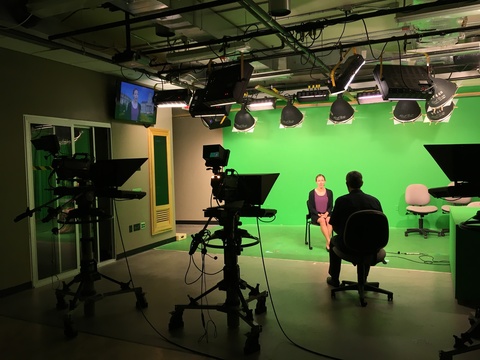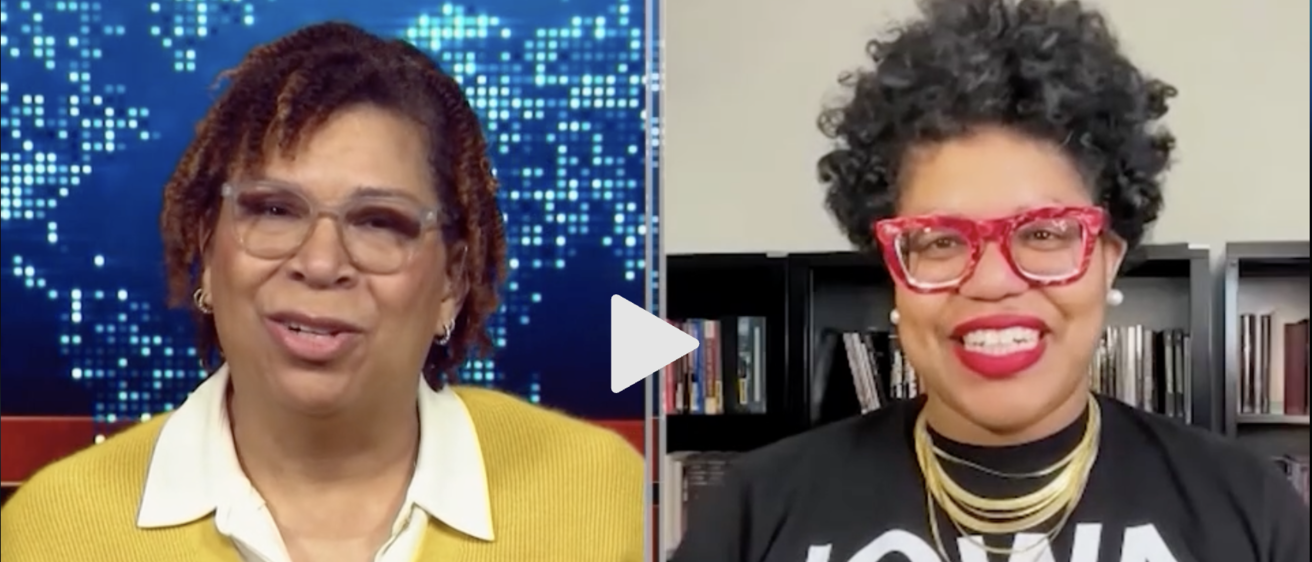When Tara Bynum, University of Iowa assistant professor of English and African American Studies, published her first book, Reading Pleasures: Everyday Black Living in Early America, she was able to share her words with an even larger audience than she could have imagined: She was interviewed by PBS in February and was featured on an April episode of The Takeaway podcast, hosted by Melissa Harris-Perry.
“What I wrote is an academic book,” Bynum says. “It is not a work of creative writing. I think coming up through higher education, an academic book or literary criticism is not necessarily a genre that gets a lot of press. It’s very niche and written for literary critics. Having a book that is, on one hand, traditionally literary criticism find its way into popular culture, even briefly, is phenomenal.”
Bynum is one of the many UI faculty members who share their work broadly with the media and the public each year in a variety of mediums.
“Faculty have their areas of expertise,” says Kristy Nabhan-Warren, associate vice president of research and Figge Chair and professor of Catholic Studies. “When we take the time to share our research with the broader public, we have the opportunity to tap into shared values and show that our research can help solve today’s problems. Based on my experiences the past few years, being a public-facing scholar can make the work of research and writing even more meaningful.”
In 2021, Nabhan-Warren published Meatpacking America: How Migration, Work, and Faith Unite and Divide the Heartland, which led to a book tour and being featured in the documentary Rising Up in the Heartland. She also wrote a piece for USA Today before the book’s publication that drew attention to the topics of migration, work, and faith that the book explored.
“I wrote Meatpacking America to raise awareness and empathy for migrants and refugees who work in dangerous, precarious industries, and I also wanted to draw attention the ties that bind all Iowans,” says Nabhan-Warren. “I think that there is a lot that connects people and that we need to work harder to see those connections and to build bridges. Engaging in public-facing scholarship can be one way that we work to build connections with people who might not be part of the University of Iowa but who have a vested interest in what we are studying, whether it is in the natural and physical sciences, arts, humanities, or social sciences.”
Dan McGehee, director of the Driving Safety Research Institute and UI associate professor in industrial and systems engineering, has been featured in the media numerous times to share the work being done by the institute. He says using jargon-free language when speaking to the wider public is essential to conveying the positives of research, such as the work the institute does to improve driver safety.
“It’s important to me, as an academic, to be able to translate what we do—which can be very technical—so that the public can understand,” he says. “Some people think using a lot of jargon is cool, but I’m the opposite. Outreach is one of our core values, and it’s a value I hold highly. When we talk to legislators and Iowans, we want them to realize the benefits of what we do here for them, the nation, and the world.”
Kristine Roggentien, communications lead for the Driving Safety Research Institute, says it’s important to make connections with local media and present yourself as an expert who can localize national media stories and explain how they affect local communities.
“We need support for our projects, and for that people need to understand what we’re doing,” Roggentien says. “It also helps for getting funds and getting more grants. Not all the language needs to be highly technical. It needs to be clear and concise.”
Aliasager Salem, associate vice president for research and Bighley Chair and professor in the College of Pharmacy, says talking to the media about your research can bring in support from individuals and organizations that can fund further research.
“As federal funding has become more challenging to secure, philanthropy is one way that faculty can continue to support a full research portfolio,” says Salem. “When individuals become aware of what you’re doing and they want to make a difference, they find a way to contribute.”
UI offers resources to help
For any faculty thinking about speaking to the media or public for the first time, or anyone who wants to improve those skills, the UI has plenty of helpful resources.
One is the Communicating Ideas Workshop, which provides tips on speaking to the media and helps faculty create a short, jargon-free description of their work. The workshop is hosted annually by the Office of the Vice President for Research.

Bynum participated in the workshop in 2022 in preparation for the release of Reading Pleasures.
“I think that workshop is pretty transformative,” Bynum says. “I had the opportunity, in context particularly with scientists, to see what worked and what didn’t work. It was helpful to have people who had no connection to the humanities hear about my research. All I heard at the workshop was ‘I’m working to help cure cancer.’ ‘I’m working to help a child hear.’ It’s easy to understand the value of that. My research focuses on 18th-century Black communities, and it was important for me to identify the ‘why,’ to explain why my research matters. The workshop helped me do that.”
Iowa also facilitates the Writing for the Public Good initiative, a public-private partnership initiative started by Nabhan-Warren and Leslie Revaux, communications director in the Office of the Vice President for Research. The initiative aims to expand the strengths of faculty across all disciplines and departments, with multiple workshops dedicated to writing essays and op-eds, including writing pieces for The Conversation, an independent news organization sharing pieces written by academic experts.
“So far, we are off to a great start, and there has been a lot of interest expressed since we received funding in July,” Nabhan-Warren says. “We have had fourteen UI authors publish articles in The Conversation since July, which is excellent, and several others are in the works. Based on personal experience, an article published in The Conversation is especially high impact because it includes hyperlinks to the author’s website and scholarship.”
Another resource is UI’s Office of Strategic Communication. The OSC communications and media relations teams can identify the best options for potentially sharing news that aligns with the university’s core missions of teaching, research, and scholarship. That may include writing stories for campus news channels such as Iowa Now or pitching research findings to local and national media. OSC also offers individualized media training to help faculty prepare for media interviews.
“When my Fox News story and the Forbes Magazine article came out, they all came out using Iowa Now as the conduit,” says Salem. “Why is that my preferred mechanism? Because I trust it. I know that OSC can make sure, working with me, that we have something that’s scientifically accurate and palatable to the general public, and that’s the perfect combination.”
Tips for talking to the media
- Make yourself valuable and available
- Know the reporter, the publication, and your audience
- Anticipate questions
- Rehearse responses out loud
- Craft key messages—be soundbite ready
- Speak clearly and be concise
- Avoid jargon, use everyday language
- Offer or request to review passages explaining or describing your research
- Be engaging, gracious, and sincere—be yourself
